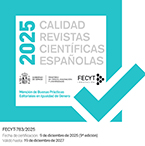Un análisis empírico de los determinantes de la implicación académica del estudiantado universitario
DOI:
https://doi.org/10.51302/tce.2019.241Palabras clave:
implicación académica, teoría de la autodeterminación, necesidades psicológicasResumen
La implicación del estudiantado se refiere a la atención, al interés y al esfuerzo que ponen los estudiantes durante el proceso de enseñanza-aprendizaje y que contribuye a su rendimiento académico. Un adecuado clima en el aula puede contribuir a mejorar esta implicación. Sin embargo, se sabe todavía relativamente poco respecto a los mecanismos específicos que explican la relación entre las actividades que lleva a cabo el profesorado en el aula y la implicación académica del estudiantado. El propósito de la presente investigación es analizar esta cuestión desde las premisas de la teoría de la autodeterminación. En concreto, a partir de datos obtenidos de 239 estudiantes universitarios españoles, demostramos que la satisfacción de las tres necesidades psicológicas básicas de competencia, autonomía y relaciones contribuye a la implicación del estudiantado y que su motivación intrínseca y su bienestar explican esta relación.
Descargas
Citas
Angrist, J. D. y Lavy, V. (2009). The effects of high stakes high school achievement awards: evidence from a randomized trial. American Economic Review, 99, 1.384-1.414.
Bailey, C., Madden, A., Alfes, K. y Fletcher, L. (2017). The meaning, antecedents and outcomes of employee en-gagement: a narrative synthesis. International Journal of Management Reviews, 19, 31-53.
Baron, R. y Kenny, D. (1986). The moderator-mediating variable distinction in social-psychological research. Journal of Personality and Social Psychology, 51, 1.173-1.182.
Boyd, F. B. (2002). Motivation to continue: enhancing literacy learning for struggling readers and writers. Reading and Writing Quarterly: Overcoming Learning Difficulties, 18, 257-277.
Broeck, A. van den, Ferris, D. L., Chang, C. H. y Rosen, C. C. (2016). A review of self-determination theory’s basic psychological needs at work. Journal of Management, 42, 1.195-1.229.
Csikszentmihalyi, M. (1990). Flow: The Psychology of Optimal Experience. New York: Harper and Row.
Deci, E. L. y Ryan, R. M (1985). Intrinsic Motivation and Self-Determination in Human Behavior. New York: Plenum.
Deci, E. L. y Ryan, R. M. (2000). The «what» and «why» of goal pursuits: human needs and the self-determination of behavior. Psychological Inquiry, 11, 227-268.
Elmore, R. F. (1990). Restructuring Schools: The Next Generation of Educational Reform. San Francisco: Jossey-Bass.
Fredrickson, B. L. (2001). The role of positive emotions in positive psychology. The broaden-and-build theory of positive emotions. American Psychologist, 56, 218-226.
Ilardi, B. C., Leone, D., Kasser, T. y Ryan, R. M. (1993). Employee and supervisor ratings of motivation: main effects and discrepancies associated with job satisfaction and adjustment in a factory setting. Journal of Applied Social Psychology, 23, 1.789-1.805.
Kahu, E. R. (2013). Framing student engagement in higher education. Studies in Higher Education, 38, 758-773.
Kasser, V. y Ryan, R. M. (1999). The relation of psychological needs for autonomy and relatedness to vitality, well-being, and mortality in a nursing home. Journal of Applied Social Psychology, 29, 935-454.
Kowal, J. y Fortier, M. S. (1999). Motivational determinants of flow: contributions from self-determination theory. The Journal of Social Psychology, 139, 355-368.
Marks, H. M. (2000). Student engagement in instructional activity: patterns in the elementary, middle, and high school years. American Educational Research Journal, 37, 153-184.
Ntoumanis, N. (2001). A self-determination approach to the understanding of motivation in physical education. British Journal of Educational Psychology, 71, 225-242.
Podsakoff, P. M., MacKenzie, S. B., Lee, J. Y. y Podsakoff, N. P. (2003). Common method biases in behavioural research: a critical review of the literature and recommended remedies. Journal of Applied Psychology, 88, 879-903.
Reeve, J. (2012). A self-determination theory perspective on student engagement. En S. L. Christenson, A. L. Reschly y C. Wylie (Eds.), Handbook of Research on Student Engagement (pp. 149-172). New York: Springer.
Reis, H. T., Sheldon, K. M., Gable, S. L., Roscoe, J. y Ryan, R. M. (2000). Daily well-being: the role of autonomy, competence, and relatedness. Personality and Social Psychology Bulletin, 26, 419-435.
Salanova, M., Schaufeli, W. B., Xanthopoulou, D. y Bakker, A. B. (2010). The gain spiral of resources and work engagement: sustaining a positive worklife. Work Engagement: A Handbook of Essential Theory and Research, 118-131.
Seifert, T. (2004). Understanding student motivation. Educational research, 46, 137-149.
Seligman, M. E. P. y Csikszentmihalyi, M. (2000). Positive psychology: an introduction. American Psychologist, 55, 5-14.
Sheldon, K. M., Ryan, R. M. y Reis, H. T. (1996). What makes for a good day? Competence and autonomy in the day and in the person. Personality and Social Psychology Bulletin, 22, 1.270-1.279.
Spector, P. E. y Brannick, M. T. (2010). Common method issues: an introduction to the feature topic in organizational research methods. Organizational Research Methods, 13, 403-406.
Standage, M., Duda, J. L. y Ntoumanis, N. (2005). A test of self-determination theory in school physical education. British Journal of Educational Psychology, 75, 411-433.
Steers, R. M., Mowday, R. T. y Shapiro, D. L. (2004). Introduction to special topic forum: the future of work motivation theory. The Academy of Management Review, 29, 379-387.
Trowler, V. y Trowler, P. (2010). Student Engagement Evidence Summary, York, UK: Higher Education Academy.
Vallerand, R. J. y Bissonnette, R. (1992). Intrinsic, extrinsic, and amotivational styles as predictors of behavior: A prospective study. Journal of Personality, 60, 599-620.
Vroom, V. H. (1964). Work and Motivation. New York: Wiley.
Walker, C. O., Greene, B. A. y Mansell, R. A. (2006). Identification with academics, intrinsic/extrinsic motivation, and self-efficacy as predictors of cognitive engagement. Learning and Individual Differences, 16, 1-12.
Descargas
Publicado
Cómo citar
Número
Sección
Licencia
Derechos de autor 2019 Inmaculada Beltrán Martín

Esta obra está bajo una licencia internacional Creative Commons Atribución-NoComercial-SinDerivadas 4.0.


























